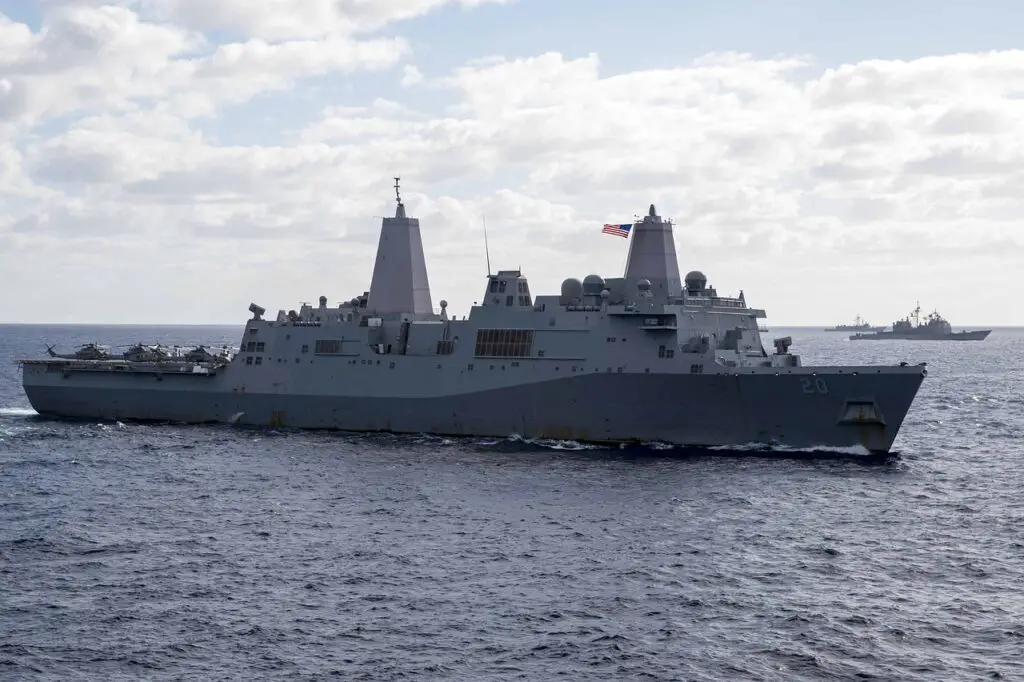Introduction:
In a move that has escalated tensions in the already-volatile region, Iran has deployed its Alborz warship to the Red Sea, passing through the strategic Bab al-Mandeb Strait. This development comes at a time when global attention is focused on the crucial waterway due to heightened geopolitical and military activities. To read morehttps://x.com/shadabAlSh68011/status/1741908143075156066?s=20

Table of Contents
Iran’s Naval Presence:
According to reports from Iran’s Tasnim news agency, the Alborz destroyer entered the Red Sea through the Bab al-Mandeb waterway, connecting the southern tip of the Red Sea with the Gulf of Aden in the Indian Ocean. The stated purpose of Iran’s naval fleet operating in the area since 2009 includes securing shipping lanes and repelling pirates.
Global Significance of the Red Sea:
The Red Sea holds immense importance in global trade, with approximately 12 percent of the world’s trade passing through it, providing a shortcut past Africa via the Suez Canal. The recent militarization of the area, marked by missile and drone attacks by Yemen’s Houthi rebels, has led to concerns among the international community.
US Response and Multinational Task Force:
Reacting to the increased threat in the Red Sea, the United States established a multinational naval task force in early December. This move followed a series of attacks by Houthi rebels on merchant vessels, prompting shipping companies to suspend passages through the region.
Recent Incidents:
A day before the Alborz entered the Red Sea, US Navy helicopters reportedly fired on Houthi rebels attempting to board a cargo ship off Yemen, resulting in the reported death of 10 fighters. Additionally, the recent killing of Sayyed Razi Mousavi, a top commander of Iran’s Revolutionary Guard Corps in Syria, in an Israeli air strike near Damascus has further fueled tensions.
International Response:
The United Kingdom has expressed concern over the situation, with Defense Secretary Grant Shapps stating that Britain is “willing to take direct action” against the Houthis to safeguard freedom of navigation in the Red Sea. British Foreign Secretary David Cameron has engaged with his Iranian counterpart, emphasizing the need for shared responsibility in preventing attacks.
Iran-Houthi Relations:
Iran’s security chief, Ali Akbar Ahmadian, reportedly held a meeting with top Houthi negotiator Mohammad Abdulsalam, praising the Houthis for their support of Palestinians and opposition to Israel. Tensions have escalated since Israel’s assault on Gaza, which began following the October 7 Hamas attacks.
Regional Dynamics and Concerns:
The escalating tensions in the Red Sea region underscore the complex dynamics at play, with multiple stakeholders pursuing their strategic interests. Iran’s historical involvement in the area, coupled with its support for Houthi rebels, has drawn scrutiny and accusations from the United States, which has alleged Iran’s deep involvement in Houthi attacks. Iran, in turn, denies these accusations, asserting that the rebels are acting independently. The recent killing of a top Iranian Revolutionary Guard Corps commander in Syria adds another layer to the regional intricacies, potentially shaping the geopolitical landscape in unforeseen ways.
International Diplomacy and Calls for De-escalation:
Amid the military posturing, diplomatic channels are being explored to ease the rising tensions. Britain’s threat of “direct action” against the Houthis highlights the seriousness of the situation, prompting dialogue between British and Iranian officials. The international community, particularly Western countries, faces the challenge of navigating through these complex geopolitical waters, balancing the need for freedom of navigation with regional security concerns.
Calls for de-escalation have come from various quarters, emphasizing the importance of diplomatic solutions to avoid further military confrontations that could have far-reaching consequences for global trade and stability. As nations closely monitor the developments in the Red Sea, the path forward remains uncertain, with the hope that diplomatic efforts will prevail in diffusing the mounting tensions in this strategically vital maritime region.
Conclusion:
As warships from various nations, including the US and Britain, gather in the region, the deployment of Iran’s Alborz warship adds a new layer of complexity to the evolving situation in the Red Sea. The international community closely watches the developments, hoping for diplomatic solutions to de-escalate tensions and ensure the continued safety of vital maritime routes.
To read more our blog:https://spotnews2023.com/index.php/2023/10/07/israel-palestine-conflict-23/



How long have you been blogging? You make it appear effortless. Both the appearance and the content of your website are outstanding.
certainly like your website but you need to take a look at the spelling on quite a few of your posts Many of them are rife with spelling problems and I find it very troublesome to inform the reality nevertheless I will definitely come back again
Hi i think that i saw you visited my web site thus i came to Return the favore Im attempting to find things to enhance my siteI suppose its ok to use a few of your ideas
Thanks I have recently been looking for info about this subject for a while and yours is the greatest I have discovered so far However what in regards to the bottom line Are you certain in regards to the supply